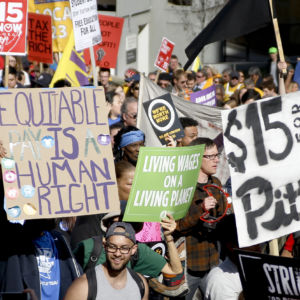The Fight for $15 movement held a nationwide protest Tuesday to commemorate what Martin Luther King Jr. did for worker rights.
King is best known for being a leader in the civil rights movement. He was also a staunch advocate for worker rights and the poor, which he saw an intertwined with civil rights. He was gunned down April 4, 1968, while in Memphis, Tennessee, to support sanitation workers who were on strike.
“But the movement did not end with Dr. King’s assassination,” Fight for $15 states on its website. “When we come together, we win. Protest works. In fact here’s another anniversary for you – one year ago today, 10 million workers won a $15 an hour minimum wage in both New York and California.”
The demonstrations were primarily focused on Memphis. Some major cities didn’t have much in the way of reported demonstrations. Major cities like Washington D.C. and New York City have already passed laws that will gradually increase their minimum wage to $15 an hour.
The Fight for $15 movement also partnered with the Movement for Black Lives for the protest. The Fight for $15 has been at the forefront of the minimum wage debate since it started in November 2012. Seattle was followed by dozens of cities and two states when it first passed the increase in June 2014.
The Fight for $15 and other supporters argue the policy is a great way to lift low-wage workers out of poverty. They have argued the current minimum wage of $7.25 an hour is too low for people to reasonably live on. The increase might also spur economic growth as more people are able to purchase things.
Those opposed to the increase warn it will actually hurt the poor by reducing employment opportunities. Employers could be forced to reduce their staff or increase prices to overcome the added cost of labor. Some critics have even expressed concern that the movement backers have alternative motives.
The movement is primarily supported by labor unions like the Service Employees International Union (SEIU). Some critics have contested the movement isn’t grassroots, but rather a ploy by unions to recruit. The Center for Union Facts released a report Monday which found the union spent over $19 million on the Fight for $15 last year.
The National Bureau of Economic Research and The Heritage Foundation found the increase will have a significant impact on employment. They found the risk is especially bad for young and low-skilled workers. The University of California, Berkeley found any losses would be marginal compared to the potential benefits.
The Job Creators Network highlighted its opposition campaign in an ad. The Fight for $50 campaign argues the focus should instead be on getting people needed skills so they can get jobs that are well paid. The campaign argues the $15 minimum wage makes that more difficult by hurting entry-level jobs.
The Employment Policies Institute, a conservative nonprofit, also released an ad to counter the protest. The ad features small business owners who were put out of work because of the $15 minimum wage. It’s the latest in a series aimed at highlighting people who have been negatively impacted by the policy.

